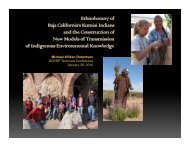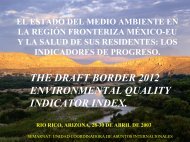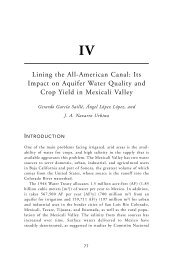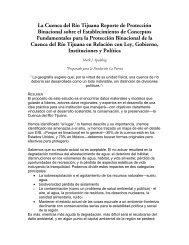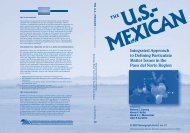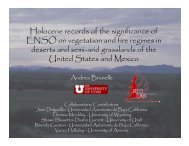Entire Book - Southwest Consortium for Environmental Research ...
Entire Book - Southwest Consortium for Environmental Research ...
Entire Book - Southwest Consortium for Environmental Research ...
Create successful ePaper yourself
Turn your PDF publications into a flip-book with our unique Google optimized e-Paper software.
Improving Transboundary Air Quality with<br />
Binational Emission Reduction Credit Trading<br />
sales taxes, thereby improving overall economic efficiency. The third<br />
argument <strong>for</strong> auctions has more to do with equity than efficiency. It<br />
is often asserted that giving permits free of charge to industry would<br />
be a give-away of public assets and that this cannot be justified <strong>for</strong><br />
reasons of justice. Of course, this argument can be stood on its<br />
head: Industry has already been allocated emission permits and to<br />
<strong>for</strong>ce it to now pay <strong>for</strong> those permits represents an unfair tax on the<br />
industry, precisely when industry is being asked to incur new abatement<br />
costs. There is no economic criteria by which this equity issue<br />
can be settled; the solution becomes a political question. 9<br />
The most common exogenous criterion <strong>for</strong> allocating permits is<br />
grandfathering, under which historical emissions are used to allocate<br />
permits. 10 Grandfathering is generally not recommended as it may<br />
introduce a bias against new firms that must purchase permits while<br />
existing firms receive them <strong>for</strong> free. 11 Moreover, grandfathering<br />
rewards bad behavior by giving the most permits to precisely the<br />
facilities generating the most emissions. In the extreme, the<br />
prospect of earning a more generous allocation might even induce<br />
bad behavior in the run-up to establishment of an emissions trading<br />
program. A final criticism against grandfathering is that it reduces<br />
the incentive to develop innovative abatement technology because<br />
innovation reduces the value of permits.<br />
With an output-based allocation, firms receive an allocation of<br />
permits based on production—more production results in more permits.<br />
Such an allocation is dynamic in that it changes with current<br />
industry conditions. Output-based allocations have generally been<br />
superior to grandfathering. First, new entrants into an industry are<br />
automatically given an allocation of permits so incumbent firms<br />
cannot use permit allocations as a barrier to entry (Malik 2002).<br />
Output-based allocations are not based on an individual firm’s past<br />
emissions, so they do not reward past bad behavior. Thus, outputbased<br />
emissions, unlike grandfathering, do not provide an incentive<br />
to pollute in anticipation of a higher allocation. Finally, outputbased<br />
allocations reduce the incentive to relocate production to a<br />
pollution haven because output at a new location would count<br />
against a firm’s allocation (assuming that the new location is covered<br />
by an emissions trading program). A problem with output-based<br />
permit allocation is that it subsidizes production. Assuming that<br />
110




